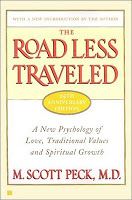 The first personal development book I ever read - almost 30 years ago - was Scott Peck's The Road Less Traveled. I was struck by his opening sentence, "Life is difficult," which is truth-telling at its best. He goes on to say that once you accept this fact, then life becomes easier because you're no longer struggling to try and make it simple.
The first personal development book I ever read - almost 30 years ago - was Scott Peck's The Road Less Traveled. I was struck by his opening sentence, "Life is difficult," which is truth-telling at its best. He goes on to say that once you accept this fact, then life becomes easier because you're no longer struggling to try and make it simple.This is one of the all-time best parenting and leadership books you'll ever read because of its focus on learning discipline, delayed gratification, and personal responsibility. As leaders and parents, we constantly search for the right balance; we want to role-model desirable behaviors for those watching us closely.
The Road Less Traveled introduced me to the terms "neurotic" and "character disorder" as they relate to responsibility. Think of them as two extremes along a personal responsibility continuum. The neurotic assumes too much responsibility, while the person with character disorder avoids it altogether.
Most likely, you're not at either end of the spectrum. But it's worth examining your attitudes and behaviors to identify where along the continuum you land when dealing with life's challenges...because your reactions have a powerful impact on the people who live and work with you.
Those with neurotic tendencies automatically assumes they are at fault when something goes wrong. Their language includes phrases like, "I should" or "I shouldn't," and they often feel guilty about what they have or haven't done. They frequently experience feelings of inferiority, blaming themselves for falling short of their own expectations or making wrong choices. These attitudes leave them vulnerable to being manipulated by others who can sense a lack self-confidence.
People inclined towards character disorder are quick to place the blame outside themselves when things don't turn out well. They say things like, "I couldn't" or "I have to." They can be difficult to be around because they never see themselves as the source of any of their problems. Instead, they take on the classic "victim" role. Counseling is often ineffective because no one can penetrate the denial and convince them that they do have choices.
Take heart that discovering the right level of responsibility is truly a life-long learning process, as Peck states so succinctly:
"The problem of distinguishing what we are and what we are not responsible for in this life is one of the greatest problems of human existence. It is never completely solved."When faced with a difficult situation, you can do something about your own attitudes and actions. Being aware of these two extremes can guide you to make an appropriate, balanced response. And you'll be better prepared to handle future challenges that are sure to come your way..
Just don't expect it to be easy. Remember, "life is difficult..."




